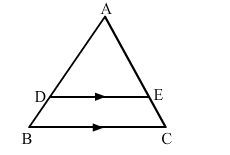In ∆ABC, DE ∥ BC so that AD = (7x − 4) cm, AE = (5x − 2) cm, DB = (3x + 4) cm and EC = 3x cm. Then, we have:

(a) x = 3
(b) x = 5
(c) x = 4
(d) x = 2.5
(c) x = 4
It is given that $D E \| B C$.
Applying Thales' theorem, we get:
$\frac{A D}{B D}=\frac{A E}{E C}$
$\Rightarrow \frac{7 x-4}{3 x+4}=\frac{5 x-2}{3 x}$
$\Rightarrow 3 x(7 x-4)=(5 x-2)(3 x+4)$
$\Rightarrow 21 x^{2}-12 x=15 x^{2}+20 x-6 x-8$
$\Rightarrow 21 x^{2}-12 x=15 x^{2}+14 x-8$
$\Rightarrow 21 x^{2}-12 x-15 x^{2}-14 x+8=0$
$\Rightarrow 6 x^{2}-26 x+8=0$
$\Rightarrow 2\left(3 x^{2}-13 x+4\right)=0$
$\Rightarrow 3 x^{2}-13 x+4=0$
$\Rightarrow 3 x^{2}-12 x-x+4=0$
$\Rightarrow 3 x(x-4)-1(x-4)=0$
$\Rightarrow(x-4)(3 x-1)=0$
$\Rightarrow x-4=0$ or $3 x-1=0$
$\Rightarrow x=4$ or $x=\frac{1}{3}$
If $x=\frac{1}{3}, 7 x-4=-\frac{5}{3}<0$; it is not possible.
Therefore, $x=4$
Click here to get exam-ready with eSaral
For making your preparation journey smoother of JEE, NEET and Class 8 to 10, grab our app now.
